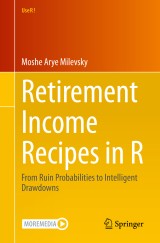Details

Retirement Income Recipes in R
From Ruin Probabilities to Intelligent DrawdownsUse R!
|
CHF 77.00 |
|
| Verlag: | Springer |
| Format: | |
| Veröffentl.: | 26.09.2020 |
| ISBN/EAN: | 9783030514341 |
| Sprache: | englisch |
Dieses eBook enthält ein Wasserzeichen.
Beschreibungen
This book provides computational tools that readers can use to flourish in the retirement income industry. Each chapter describes recipe-like algorithms and explains how to implement them via simple scripts in the freely available R coding language. Students can use those skills to generate quantitative answers to the most common questions in retirement income planning, as well as to develop a deeper understanding of the finance and economics underlying the field itself. The book will be an excellent asset for experienced students who are interested in advanced wealth management, and specifically within courses that focus on holistic modeling of the retirement income process. The material will also be useful to current and future wealth management professionals within the financial services industry. Readers should have a solid understanding of financial principles, as well as a rudimentary background in economics and accounting.
1 Setting Expectations and Deviations.- 2 Loading and Getting to Know R.- 3 Coding the (Simple) Financial Life-cycle Model.- 4 Data in R: The Family Balance Sheet.- 5 Portfolio Longevity: Deterministic & Stochastic.- 6 Modeling the Risk of Sequence-of-Returns.- 7 Modeling Human Longevity and Life Tables.- 8 Life & Death in Continuous Time: Gompertz 101.- 9 The Lifetime Ruin Probability (LRP).- 10 Life Annuities: From Immediate to Deferred.- 11 Intelligent Drawdown Rates.- 12 Pensionization: From Benefits to Utility.- 13 Biological (and other) Ages.- 14 Exotic Annuities for Longevity Risk.- 15 Very Last Thoughts.- Glossary of User Defined R-Functions.
<p><b>Moshe Arye Milevsky</b> is a tenured professor of finance at the Schulich School of Business and a member of the Graduate Faculty in Mathematics and Statistics at York University in Toronto, Canada, where he teaches courses on wealth management, insurance and retirement planning. He has written over sixty-five peer-reviewed articles, and this is his fifteenth published book. His prior work, <i>King William’s Tontine:</i><i> </i><i>Why the Retirement Annuity of the Future Should Resemble Its Past, </i>was awarded the Kulp-Wright Book Award from the <i>American Risk and Insurance Association.</i> </p><p>Professor Milevsky is an Associate Editor of <i>Insurance: Mathematics & Economics,</i><i> </i>as well as <i>The Journal of Pension Economics & Finance. </i>He is also a Fellow of the <i>Fields Institute for Research in Mathematical Sciences, </i>where he was previously a member of the board of directors and active in their scientific and commercial activities.</p> In additionto his scholarly work Professor Milevsky is a well-known industry consultant, keynote speaker and fin-tech entrepreneur, with a number of U.S. patents. He was named by <i>Investment Advisor Magazine </i>as one of the 35 most influential people in the U.S. financial advisory business during the last 35 years and received a lifetime achievement award from the <i>Retirement Income Industry Association. </i>He recently joined forces with Guardian Capital Group (Canada) to help implement many of the ideas contained in this book.
This book provides computational tools that readers can use to flourish in the retirement income industry. Each chapter describes recipe-like algorithms and explains how to implement them via simple scripts in the freely available R coding language. Students can use those skills to generate quantitative answers to the most common questions in retirement income planning, as well as to develop a deeper understanding of the finance and economics underlying the field itself. The book will be an excellent asset for experienced students who are interested in advanced wealth management, and specifically within courses that focus on holistic modeling of the retirement income process. The material will also be useful to current and future wealth management professionals within the financial services industry. Readers should have a solid understanding of financial principles, as well as a rudimentary background in economics and accounting.
Teaches readers to write simple scripts using R code with algorithms provided in each chapter, so that readers can use this computational tool in the world of wealth management Provides a targeted resource for future retirement services professionals, to be used in the classroom and beyond Offers an extended education in wealth management for those with an established education in personal finance, financial economics, and accounting Includes supplementary material: sn.pub/extras Request lecturer material: sn.pub/lecturer-material
This book provides computational tools that readers can use to flourish in the retirement income industry. Each chapter describes recipe-like algorithms and explains how to implement them via simple scripts in the freely available R coding language. Students can use those skills to generate quantitative answers to the most common questions in retirement income planning, as well as to develop a deeper understanding of the finance and economics underlying the field itself. The book will be an excellent asset for experienced students who are interested in advanced wealth management, and specifically within courses that focus on holistic modeling of the retirement income process. The material will also be useful to current and future wealth management professionals within the financial services industry. Readers should have a solid understanding of financial principles, as well as a rudimentary background in economics and accounting.

















